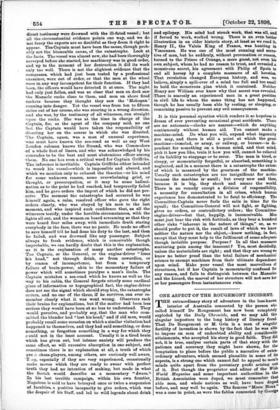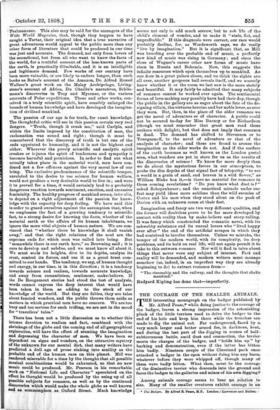ONEASPECT OF THE ROITGEMONT INCIDENT.
THE extraordinary story of adventure in the less-known interior of Australia concocted by the person who called himself De Rougemont has now been completely exploded by the Daily Chronicle, and we may add this singular imposture to the long history of literary fraud. That De Rougemont or M. Grin is a man of singular fertility of invention is shown by the fact that he was able to impose on men of undoubted ability and considerable attainments, who accepted his story in good faith. They did not, it is true, analyse certain parts of that story with the patience and accuracy they might have shown, for the temptation to place before the public a narrative of extra- ordinary adventure, which seemed plausible in some of its aspects, is a strong one which cannot fail to appeal to men's minds quite apart from the pecuniary profit arising out of it. But though the proprietor and editor of the Wide World Magazine and some important authorities in the British Association were duped, we must remember that able men, and whole nations as well, have been duped before, and may well be again. The famous "Moon Hoax was a case in point, as were the fables concocted by George
Psalmanazar. This also may be said for the managers of the Wide World Magazine, that, though they happen to have caught a Tartar, their original idea that a true narrative of great adventures would appeal to the public more than any other form of literature that could be produced in our time was just and accurate. The demand, not only from lovers of the sensational, but from all who want to know the facts of the world, for a truthful account of the less-known parts of the earth, is practically illimitable, and it is an intelligible and legitimate demand. Few works of our century have been more valuable, or are likely to endure longer, than such books as Bates's account of the Amazon, Dr. Alfred Russel Wallace's great work on the Malay Archipelago, Living- stone's account of Africa, Du Chaillu's narratives, Schlie- mann's discoveries in Troy and Mycenae, or the various accounts of Polar expeditions. These and other works, con- ceived in a truly scientific spirit, have sensibly enlarged the bounds of human knowledge and have developed the imagina- tion of civilised mankind.
The passion of our age is for truth, for exact knowledge. The thoughtful critic will see in this passion certain very real dangers. "Truth, though it crush me," said Carlyle, and within the limits imposed by the constitution of man, the exclamation was sound and right ; though it must be remembered that the discovery of truth is but one of the ends appointed to humanity, and it is not the highest end either. Wherever the purely scientific and analytic spirit crushes or injures the spirit of tenderness and sympathy it becomes harmful and pernicious. In order to find out what actually takes place in the material world, men have con- doned not a few offences against the very moral law of our being. The exclusive predominance of the scientific temper, unrelated to the desire to use science for human welfare, would not produce a very desirable world to live in ; and were it to prevail for a time, it would certainly lead to a probably dangerous reaction towards sentiment, emotion, and excessive femininity. The healthy progress of mankind seems, inter alia, to depend on a right adjustment of the passion for know- ledge with the capacity for deep feeling. We have said this in order to guard ourselves against the assumption that, when we emphasise the fact of a growing tendency to scientific fact, to a strong desire for knowing the facts, whether of the material earth or the affairs of its human inhabitants, we ignore the more vital objects of human nature. We are con- vinced that "whether there be knowledge it shall vanish away," and that the right relations of the soul are the supreme ends for which man was called into being. But "meanwhile there is our earth here," as Browning said ; it is ours to develop and subdue, and we must know all about it. We must scale its heights, dive to its depths, analyse its crust, control its forces, and use it as a great trust com- mitted to our hands. The tendency, we say, of human thought and energy, in our time, is in this direction ; it is a tendency towards science and realism, towards accurate knowledge, and away from romanticism, sentiment, make-believe. If the De Rougemont stories had stood the test of analysis, words cannot express the deep interest that would have been taken in them as adding to the stock of our knowledge of the world. But they are fables, they are tales about fancied wonders, and the public throws them aside as matters in which practical men have no concern. We are too busy and too serious for such trifling, we are not in the mood for "travellers' tales."
There has been not a little discussion as to whether this intense devotion to realism and fact, combined with the shrinkage of the globe and the coming end of all geographical exploration, will have the effect of stunting the imagination and depressing the character of men. We have been so dependent on signs and wonders, on the attractive mystery of the unknown for our mental diet, that many writers have predicted a dull age of prose sinking into senility as the probable end of the human race on this planet. Mill was rendered miserable for a time by the thonght that all possible musical combinations would be exhausted, so that no new music could be produced. Mr. Pearson in his remarkable Work on " National Life and Character" speculated on the effect he thought would be produced by the using up of all Possible subjects for romance, as well as by the continued discoveries which would make the whole globe as well known and as commonplace as Oxford Street. Much knowledge seems not only to add much sorrow, but to rob life of the child's element of wonder, and to make it "stale, flat, and unprofitable." If this diagnosis were correct, our race would probably decline, for, as Wordsworth says, we do really "live by imagination." But it is significant that, as Mill was brooding over the probable end of music, a perfectly new kind of music was rising in Germany ; and since the- close of Wagner's career other new forms of music have risen in Russia and Bohemia. Now, this suggests the infinite resources which open themselves up to mankind. As one door in a great palace closes, and we think the sights are all over, another gorgeous hall reveals itself, and we scarcely know whether it or the room we last saw is the more stately and beautiful. It may fairly be admitted that many subjects of romance cannot be worked over again. The sentimental forms of love-making may possibly have had their day, though the public in the gallery are as eager about the fate of the de- signing villain, the virtuous heroine and her noble lover, as ever they were. But, then, in the place of the older romance we get the novel of adventure or of character. A public could not be secured to-day for Miss Burney or for Richardson (though we must remember that great men read those authors with delight), but that does not imply that romance is dead. The demand has shifted to Stevenson or to Tourgueneff, to the novel of adventure or that of the analysis of character ; and these are found to arouse the imagination as the older works do not. And if the surface of the earth becomes as well known as the London postal area, what wonders are yet in store for ne as the results of the discoveries of science ! To know far more deeply than we do about the mysterious forces in our atmosphere, tc. probe the dim depths of that signal fact of telepathy, "to see a world in a grain of sand, and heaven in a wild flower," as William Blake has it,—is there no material for romance in these coming revelations ? "Do you know what dust is ? " asked Schopenhaner ; and the unnoticed miracle under our feet may yield ideas more sublime than the wild surmise of Cortez and his men when they stood silent on the peak of Darien with an unknown ocean at their feet.
Imagination and fancy are two very different qualities, and the former will doubtless prove to be far more developed by contact with reality than by make-believe and story-telling. It was fancy which constructed the romantic novel, with its cobwebby substance and its unreal lovers who "lived happy ever after" the end of the artificial scrapes in which they had contrived to involve themselves. Unless we mistake, the temper of the modern world, with its complexity, its deep problems, and its hold on real life, will not again permit it to take to this outworn romance. Nor will it find in tales about, things that never were any subject of interest. Fact an reality will be demanded, and modern writers must manage somehow (as, indeed, in an imperfect way they are already beginning to do) to extract romance from-
" The steamship and the railway, and the thoughts that shake mankind."
Rudyard Kipling has done that—imperfectly.











































 Previous page
Previous page